
University of Porto
Encyclopedia
The University of Porto is a Portuguese
public university
located in Porto
, and founded 22 March 1911. It is the largest Portuguese university by number of enrolled students and has one of the most noted research outputs in Portugal. It was considered one of the 100 best Universities of Europe, in 2010.
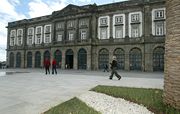 The university
The university
results, essentially, from two higher education institutions created during the 19th century in Porto: the Politechnical Academy (Academia Politécnica) and the Medical-Surgical School (Escola Médico-Cirúrgica). After the 1910 revolution in Portugal
, starting the First Republic, the Universities of Lisbon and Porto
were created. Initially, the University of Porto was composed of three faculties:
The inauguration of the University of Porto was on July 16, 1911, and as first Reitor (rector
), the mathematician Gomes Teixeira was chosen. At this time, the university became economically and scientifically independent, and teaching autonomy was officially recognised. Currently, there are 14 faculties and a postgraduate business school at the university.
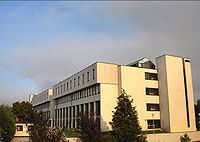

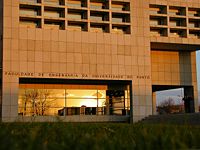 Today, about 28,000 students (11,000 postgraduate) attend the courses provided by the U.Porto's fifteen schools (13 faculties, a biomedical sciences institute and a business school, each one with a considerable degree of autonomy).
Today, about 28,000 students (11,000 postgraduate) attend the courses provided by the U.Porto's fifteen schools (13 faculties, a biomedical sciences institute and a business school, each one with a considerable degree of autonomy).
Globally, the U. Porto offers 63 graduate degree courses, over 160 master courses, and several doctoral degree courses and other specialization courses, supported by 2300 lecturers and a technical and administrative staff of over 1600 people.
In 2007, a Higher Education Evaluation & Accreditation Council of Taiwan's ranking, placed the University of Porto in 459. It was the only Portuguese university in the top 500 according to the Taiwanese ranking.
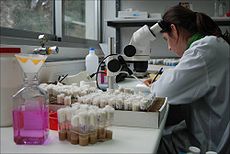 R&D activities at the University of Porto have significantly expanded over the last years, mainly as a result of academic qualification and increased funding of R&D facilities and research grants through competitive programs with external independent evaluation by international peer review committees.
R&D activities at the University of Porto have significantly expanded over the last years, mainly as a result of academic qualification and increased funding of R&D facilities and research grants through competitive programs with external independent evaluation by international peer review committees.
Although R&D centers vary noticeably in dimension, aims and structure — from small units to large centers, conducting specialized or interdisciplinary work, faculty integrated or independent — they are present in almost every field of knowledge showing a shared vision towards a modern research university. Many of these centers are interface institutions whose aim is the development of links of cooperation between the University and external entities such as enterprises or governmental organizations. Among the most recognized research centers of the university are the IBMC - Instituto de Biologia Molecular e Celular
(Institute of Molecular and Cell Biology), IPATIMUP - Instituto de Patologia e Imunologia Molecular da Universidade do Porto (Institute of Molecular Pathology and Immunology of the University of Porto) and INESC-Porto - Instituto de Engenharia de Sistemas e Computadores (Research Institute of Computer Systems).
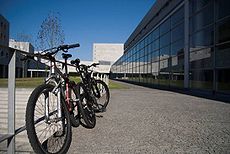 The University buildings — faculties, R&D centres, student residences and sport facilities — are grouped in three main sites (called ‘poles’). In the city centre — where the neoclassical
The University buildings — faculties, R&D centres, student residences and sport facilities — are grouped in three main sites (called ‘poles’). In the city centre — where the neoclassical
building of architect Carlos Amarante
marks the birthplace of the University — lies Pole 1; Pole 2 (Asprela) is a campus in the northern end of Porto; Pole 3 (Campo Alegre) is located in the western part of the city, over the river Douro bank, not far from Pole 1. A number of other institutes and centers are scattered all over the city and even beyond its limits.
The development of strong links with the community is one of the University's main concerns. This lies behind the constitution of the Foundation Science and Development, an institution which associates University and municipality and is responsible for the management of two important cultural facilities located in Pole 3: the Porto Planetarium and the Campo Alegre Theatre. Another evidence of this concern is the priority given to Continuing Education, with the development of multidisciplinary courses, the establishment of cooperation protocols, the training of teachers, the foundation of the Association of Portuguese Universities for Continuing Education and the providing of on-line courses.
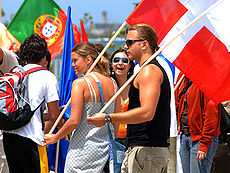 The University of Porto is deeply committed to the development of its international relations, taking part in several university networks and cooperation groups — not only within Europe but also extending to the southern hemisphere countries of Portuguese language. The increasing numbers of students taking part in mobility programs, the exchange of lecturers and researchers, the participation in international R&D projects and the involvement in cooperative projects with Brazil and several African countries are a reflection of the importance the University gives to its international orientation. This is why, every year, a growing number of students and scientists from all over the world choose the University of Porto as their preferred teaching and research institution. Just last year (2007), around 2.000 foreign students completed their higher education in the University of Porto.
The University of Porto is deeply committed to the development of its international relations, taking part in several university networks and cooperation groups — not only within Europe but also extending to the southern hemisphere countries of Portuguese language. The increasing numbers of students taking part in mobility programs, the exchange of lecturers and researchers, the participation in international R&D projects and the involvement in cooperative projects with Brazil and several African countries are a reflection of the importance the University gives to its international orientation. This is why, every year, a growing number of students and scientists from all over the world choose the University of Porto as their preferred teaching and research institution. Just last year (2007), around 2.000 foreign students completed their higher education in the University of Porto.
Finally, one should mention the active role the University has played in international actions concerning the assessment and funding of higher education institutions, both fundamental to the development of Portuguese models in these areas.
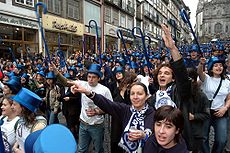 The students of the University of Porto organise several extra curricular events. In sports, those include the activities promoted within G.A.D.U.P. and C.D.U.P.. In culture and academic festivities, the events range from the Latada to the Queima das Fitas
The students of the University of Porto organise several extra curricular events. In sports, those include the activities promoted within G.A.D.U.P. and C.D.U.P.. In culture and academic festivities, the events range from the Latada to the Queima das Fitas
. This last event is organized in cooperation with FAP - Federação Académica do Porto and it is considered the biggest party of the students in Porto.
See more University of Porto Famous Alumni (Official page)
Portugal
Portugal , officially the Portuguese Republic is a country situated in southwestern Europe on the Iberian Peninsula. Portugal is the westernmost country of Europe, and is bordered by the Atlantic Ocean to the West and South and by Spain to the North and East. The Atlantic archipelagos of the...
public university
Public university
A public university is a university that is predominantly funded by public means through a national or subnational government, as opposed to private universities. A national university may or may not be considered a public university, depending on regions...
located in Porto
Porto
Porto , also known as Oporto in English, is the second largest city in Portugal and one of the major urban areas in the Iberian Peninsula. Its administrative limits include a population of 237,559 inhabitants distributed within 15 civil parishes...
, and founded 22 March 1911. It is the largest Portuguese university by number of enrolled students and has one of the most noted research outputs in Portugal. It was considered one of the 100 best Universities of Europe, in 2010.
History

University
A university is an institution of higher education and research, which grants academic degrees in a variety of subjects. A university is an organisation that provides both undergraduate education and postgraduate education...
results, essentially, from two higher education institutions created during the 19th century in Porto: the Politechnical Academy (Academia Politécnica) and the Medical-Surgical School (Escola Médico-Cirúrgica). After the 1910 revolution in Portugal
Portugal
Portugal , officially the Portuguese Republic is a country situated in southwestern Europe on the Iberian Peninsula. Portugal is the westernmost country of Europe, and is bordered by the Atlantic Ocean to the West and South and by Spain to the North and East. The Atlantic archipelagos of the...
, starting the First Republic, the Universities of Lisbon and Porto
Porto
Porto , also known as Oporto in English, is the second largest city in Portugal and one of the major urban areas in the Iberian Peninsula. Its administrative limits include a population of 237,559 inhabitants distributed within 15 civil parishes...
were created. Initially, the University of Porto was composed of three faculties:
- Faculty of Mathematical, Physics, Chemical, Historical and Natural Sciences (including the Engineering School)
- Medical-Surgical School (including the Pharmaceutical School)
- Faculty of Trade (never implemented)
The inauguration of the University of Porto was on July 16, 1911, and as first Reitor (rector
Rector
The word rector has a number of different meanings; it is widely used to refer to an academic, religious or political administrator...
), the mathematician Gomes Teixeira was chosen. At this time, the university became economically and scientifically independent, and teaching autonomy was officially recognised. Currently, there are 14 faculties and a postgraduate business school at the university.
Organization



- Faculty of ArchitecturePorto School of ArchitectureThe Faculty of Architecture of the University of Porto , or FAUP, is an architecture faculty located in Porto, Portugal, and one of the thirteen constituent faculties of the University of Porto.- History :...
, FAUP - Faculty of Dental Medicine, FMDUP
- Faculty of Economics, FEP
- Faculty of EngineeringFaculdade de Engenharia da Universidade do PortoThe Faculdade de Engenharia da Universidade do Porto is the engineering faculty of the University of Porto, in Porto, Portugal. With its origins in the 18th century, the institution became known as Faculdade de Engenharia in 1926. It awards degrees from the licentiate to doctorate, in several...
, FEUP - Faculty of Fine Arts, FBAUP
- Faculty of Law, FDUP
- Faculty of Arts, FLUP
- Faculty of Medicine, FMUP
- Faculty of Nutrition and Food Science , FCNAUP
- Faculty of Pharmacy, FFUP
- Faculty of Psychology and Educational Sciences, FPCEUP
- Faculty of Sciences, FCUPhttp://www.fc.up.pt
- Faculty of Sport, FADEUP
- Institute of Biomedical Sciences Abel Salazar, ICBAS
- Porto School of Management, EGP
Globally, the U. Porto offers 63 graduate degree courses, over 160 master courses, and several doctoral degree courses and other specialization courses, supported by 2300 lecturers and a technical and administrative staff of over 1600 people.
In 2007, a Higher Education Evaluation & Accreditation Council of Taiwan's ranking, placed the University of Porto in 459. It was the only Portuguese university in the top 500 according to the Taiwanese ranking.
R&D

Although R&D centers vary noticeably in dimension, aims and structure — from small units to large centers, conducting specialized or interdisciplinary work, faculty integrated or independent — they are present in almost every field of knowledge showing a shared vision towards a modern research university. Many of these centers are interface institutions whose aim is the development of links of cooperation between the University and external entities such as enterprises or governmental organizations. Among the most recognized research centers of the university are the IBMC - Instituto de Biologia Molecular e Celular
Instituto de Biologia Molecular e Celular
The Institute of Molecular and Cell Biology in Porto, Portugal, was founded in the 1990s as a multidisciplinary research institution in the fields of genetic diseases, infectious diseases and immunology, neuroscience, stress and structural biology.Most of its investigators are University of...
(Institute of Molecular and Cell Biology), IPATIMUP - Instituto de Patologia e Imunologia Molecular da Universidade do Porto (Institute of Molecular Pathology and Immunology of the University of Porto) and INESC-Porto - Instituto de Engenharia de Sistemas e Computadores (Research Institute of Computer Systems).
Facilities

Neoclassical architecture
Neoclassical architecture was an architectural style produced by the neoclassical movement that began in the mid-18th century, manifested both in its details as a reaction against the Rococo style of naturalistic ornament, and in its architectural formulas as an outgrowth of some classicizing...
building of architect Carlos Amarante
Carlos Amarante
Carlos Luís Ferreira da Cruz Amarante was an important Portuguese engineer and architect.Amarante's father was musician in the court of the Bishop of Braga. He began pursuing an ecclesiastical career, but left the seminary when he was 23 years old to marry Luísa Clara Xavier...
marks the birthplace of the University — lies Pole 1; Pole 2 (Asprela) is a campus in the northern end of Porto; Pole 3 (Campo Alegre) is located in the western part of the city, over the river Douro bank, not far from Pole 1. A number of other institutes and centers are scattered all over the city and even beyond its limits.
The development of strong links with the community is one of the University's main concerns. This lies behind the constitution of the Foundation Science and Development, an institution which associates University and municipality and is responsible for the management of two important cultural facilities located in Pole 3: the Porto Planetarium and the Campo Alegre Theatre. Another evidence of this concern is the priority given to Continuing Education, with the development of multidisciplinary courses, the establishment of cooperation protocols, the training of teachers, the foundation of the Association of Portuguese Universities for Continuing Education and the providing of on-line courses.
International Cooperation

Finally, one should mention the active role the University has played in international actions concerning the assessment and funding of higher education institutions, both fundamental to the development of Portuguese models in these areas.
Students

Queima das Fitas
The Queima das Fitas is a traditional festivity of the students of some Portuguese universities, organized originally by the students of the University of Coimbra.- History :...
. This last event is organized in cooperation with FAP - Federação Académica do Porto and it is considered the biggest party of the students in Porto.
Famous alumni and professors
- Abel SalazarAbel SalazarAbel de Lima Salazar , was a Portuguese physician, lecturer, researcher, writer and painter who worked and lived in Porto...
, doctor, professor, painter. - Agostinho da SilvaAgostinho da SilvaGeorge Agostinho Baptista da Silva, GCSE was a Portuguese philosopher, essayist and writer. His thought combines elements of pantheism and millenarism, an ethic of renunciation , and a belief in freedom as the most important feature of man. Anti-dogmatic, he asserts that truth is only found in the...
, philosopher. - António CarneiroAntónio CarneiroAntónio Carneiro was a Portuguese painter, perhaps the most innovative from the second naturalist generation, even more than Aurélia de Souza....
, painter. - António Pinho VargasAntónio Pinho VargasAntónio Pinho Vargas is a Portuguese composer and pianist specialized in the performance and writing of Jazz and as well as Contemporary Music....
, pianist and composer. - Alexandre QuintanilhaAlexandre QuintanilhaAlexandre Tiedtke Quintanilha, GOSE is a Portuguese scientist, former director of the Instituto de Biologia Molecular e Celular of the University of Porto and Professor at ICBAS - Abel Salazar Institute of Biomedical Sciences.-Biography:Alexandre Tiedtke Quintanilha, GOSE was born in Lourenço...
, scientist. - Anake Kijjoa, professor and scientist.
- António Soares dos ReisAntónio Soares dos ReisAntónio Soares dos Reis was a Portuguese sculptor.-Studies:He first studied at the Portuense Academy of Fine Arts, where he graduated in sculpture in 1867. He studied at the Fine Arts Imperial School of Paris, from 1867 to 1870, where he achieved several prizes, and in Rome...
, sculptor. - Artur Aguas, professor and scientist.
- Belmiro de AzevedoBelmiro de AzevedoBelmiro Mendes de Azevedo is a Portuguese entrepreneur, ranked by Forbes as the 605th richest person in the world , as well as the 2nd richest in Portugal, with an estimated wealth of US$2 billion...
, businessperson. - Camilo Castelo BrancoCamilo Castelo BrancoCamilo Ferreira Botelho Castelo-Branco,1st Viscount de Correia Botelho , was a prolific Portuguese writer of the 19th century, having authored over 260 books . His writing is, overall, considered original in that it combines the dramatic and sentimental spirit of Romanticism with a highly personal...
, writer. - Corino de Andrade, professor and scientist.
- Edgar CardosoEdgar CardosoEdgar Cardoso was a noted Portuguese civil engineer and university professor. In Portugal, Edgar Cardoso was a pioneer of experimental analysis of structures and of high precision instruments development for measure mechanical sizes in the little models and in his own works.-Early life:Cardoso...
, civil engineer and professor. - Eduardo Souto Moura, architect.
- Elisa FerreiraElisa FerreiraElisa Ferreira, GCC is a Portuguese politician and Member of the European Parliament for the Socialist Party; part of the Party of European Socialists.-References:...
, politician. - Fernando Teixeira dos SantosFernando Teixeira dos SantosFernando Teixeira dos Santos , GOIH is a Portuguese economist and professor. He was Minister of Finance in the Portuguese Government led by José Sócrates .-Career:...
, minister. - Francisco LaranjoFrancisco LaranjoFrancisco Laranjo is a contemporary Portuguese Painter and Educator.Laranjo was born in 1955 Lamego, Portugal. He is Head of School of Arts and Associate Professor of Porto University and has been lecturer in many Universities in cities such as Bilbao, Ottawa, Sheffield, Alexandria, Sofia, Paris...
, painter and professor. - Froilano de MelloFroilano de MelloFroilano de Mello was an Indo-Portuguese microbiologist, medical scientist, professor, author and an independent MP in the Portuguese parliament....
, microbiologist and MP in the Portuguese National Assembly. - José Pacheco PereiraJosé Pacheco PereiraJosé Álvaro Machado Pacheco Pereira, GCL is a Portuguese political analyst, historian and politician, a member of PSD .- Biography :He was born in Porto and graduated in Philosophy from the University of Porto...
, teacher and political analyst. - Júlio DinisJúlio DinisJúlio Dinis, pseudonym of Joaquim Guilherme Gomes Coelho was a Portuguese doctor and writer.Júlio Dinis died at the young age of 31 of tuberculosis, and some of its works were published posthumously...
, doctor, writer. - Kaúlza de ArriagaKaúlza de ArriagaKaúlza de Oliveira de Arriaga, OA, GCC, OC, OIH was a Portuguese General, writer, professor and politician...
, Brigadier General, writer, professor and politician. - Luís Archer, biologist, epistemologist and professor.
- Luís PristaLuís PristaLuís Vasco Nogueira Prista , or Professor Prista , was a Cathedatric Professor in Pharmaceutical Technology at the Department of Pharmaceutical Technology, Faculty of Pharmacy, University of Porto, Portugal...
, professor and scientist. - Richard ZimlerRichard ZimlerRichard Zimler is a best-selling author of fiction. His books, which have earned him a 1994 National Endowment of the Arts Fellowship in Fiction and the 1998 Herodotus Award, have been published in many countries and translated into more than 20 languages...
, professor and writer. - Mário Sousa, professor and scientist.
- Nuno Grande, professor and scientist.
- Rómulo de Carvalho / António Gedeão, scientist and poet.
- Rui ReininhoRui ReininhoRui Reininho is since 1981 the lead vocalist of Portuguese rock band GNR. Singer, author of numerous lyrics and songs, he was one of the most loved by the media - and often controversial - symbol of the Portuguese rock scene. He was born in Porto....
, musician. - Rui RioRui RioRui Fernando da Silva Rio, GCIH is a Portuguese politician and Mayor of Porto .Rio studied at the Colégio Alemão do Porto , and earned his degree in economics at the University of Porto...
, politician and mayor of Porto. - Sérgio GodinhoSérgio GodinhoSérgio Godinho, OL is a Portuguese poet, composer, and singer. He was born on August 31, 1945 in Porto, Portugal, and is one of the most influential popular musicians in Portugal...
, musician. - Alvaro Siza, architect.
- Teresa Lago, astrophysicist and professor.
- Victor de Sá, historian and professor.
See more University of Porto Famous Alumni (Official page)
See also
- List of modern universities in Europe (1801–1945)
- List of universities in Portugal
- Higher education in PortugalHigher education in PortugalHigher education in Portugal is divided into two main subsystems: university and polytechnic education. It is provided in autonomous public universities, private universities, public or private university institutes, polytechnic institutions and higher education institutions of other types...

